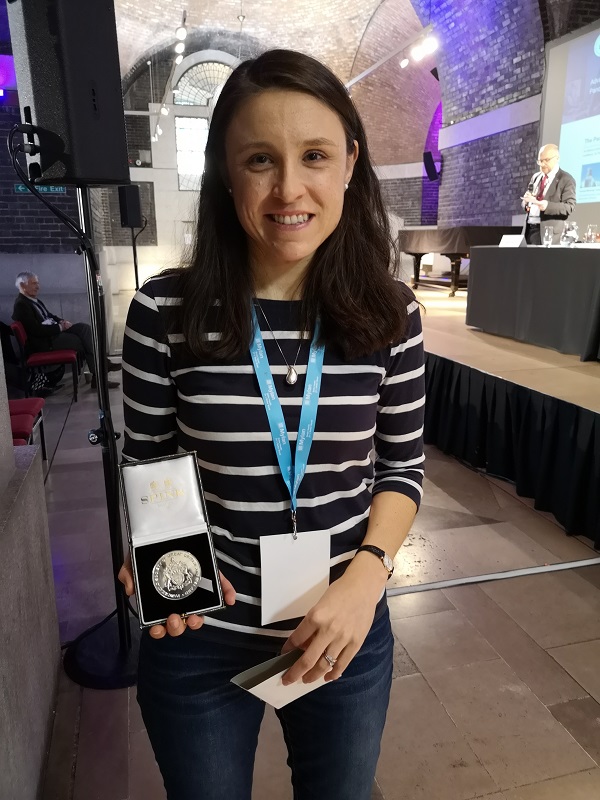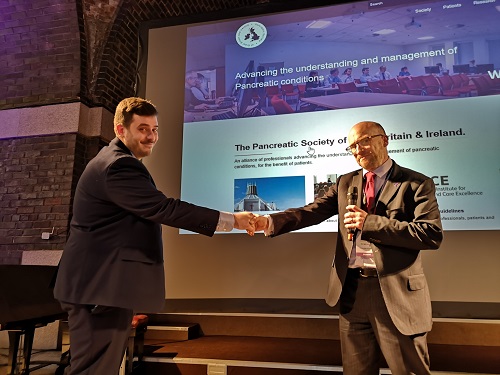Enhancing Multidisciplinary Tumor Board Decision-Making in Pancreatic Cancer Using Cinematic Rendering
30 Dec 2025, 10 a.m.
Publication date: Available online 29 December 2025Source: PancreatologyAuthor(s): Timur Buniatov, ...
Following a very successful meeting at the Metropolitan Cathedral Liverpool. Awards were made for the best Poster and Oral Presentations

 Prognostic significance of early weight loss during chemotherapy in patients (pts) with inoperable pancreatic cancer (PC)
Prognostic significance of early weight loss during chemotherapy in patients (pts) with inoperable pancreatic cancer (PC)
Authors: Lindsay E Carnie - Nutrition & Dietetics The Christie NHS Foundation Trust,Angela Lamarca - Medical Oncology The Christie NHS Foundation Trust,Mairead G McNamara - Medical Oncology The Christie NHS Foundation Trust,Richard A Hubner - Medical Oncology The Christie NHS Foundation Trust,Juan W Valle - Medical Oncology The Christie NHS Foundation Trust,Marc Abraham - Nutrition & dietetics The Christie NHS Foundation Trust,
Category: Malignant
Aim: Weight loss at diagnosis is common in pts with PC and is known to adversely affect quality of life, tolerance to treatment and overall survival (OS). Little is known about the impact that weight loss occurring during treatment has on survival outcomes. This study aimed to investigate if early weight loss during systemic treatment for inoperable PC affects OS.
Method: This retrospective study included newly diagnosed pts with inoperable PC. Consecutive pts starting first-line palliative chemotherapy (chemo) between Jan’15 – Jan’19 with data on percentage weight loss at week 4 following commencement of treatment (%WLWeek4) were eligible. %WLWeek4 was dichotomised using 5% cut-off. OS was measured from cycle 1, day 1 of chemo. Survival analysis was performed using Cox regression (Stata version 12).
Results: Of 255 eligible pts the median age was 67 years (range 25-85), 54.5% male; 59.2% had head/neck PC; 52.6% metastatic. Eastern Cooperative Oncology Group Performance Status (ECOG-PS) 0-1: 86.3%. Palliative chemo: triplet (32.2%), doublet (42.7%), monotherapy (25.1%).
At the start of chemo, the median weight was 68kg (range 37.1-127kg). The median %WLWeek4 was -2.05% (95% confidence interval (CI) -2.5 to -1.7); %WLWeek4 was ?5% in 59/255 pts (23.1%). Pts on triplet chemo were more likely to develop %WLWeek4 of ?5% [35.4% (triplet) vs 19.3% (doublet) vs 14.1% (monotherapy); P=0.005].
Median OS was 9.7 months (m) (95% CI 8.5-10.4). Multivariable Cox regression demonstrated shorter OS if %WLWeek4 ?5% (median OS 7.4m (95% CI 6.3-10.0) vs. 9.9m (95% CI 9.2-12.1); HR 2.37 (95% CI 1.64-3.42), P=0.000); maintained when adjusted for other factors [stage (HR 1.76 (95% CI 1.32-2.36), P=0.000), age (HR 0.98 (95% CI 0.96-0.99), P=0.024), number of chemo drugs (HR 0.44 (95% CI 0.33-0.57), P=0.000), ECOG-PS (HR 1.51 (95% CI 1.07-2.15), P=0.020)], including the response to therapy [progression at first CT scan (HR 4.14 (95% CI 2.99-5.73), P=0.000)] supporting that %WLWeek4 impacted OS regardless of response to therapy.
Conclusion: Early weight loss of ?5% is associated with shorter OS, regardless of disease progression/response to therapy and seems more prevalent in pts undergoing triplet chemo. Intervention studies targeting the causes of weight loss should be considered to optimise patient outcomes.
 Pasireotide and postoperative pancreatic fistula: a meta-analysis of available evidence
Pasireotide and postoperative pancreatic fistula: a meta-analysis of available evidence
Authors: Dimitrios Karavias - Department of HPB and Transplant Surgery Freeman Hospital, Newcastle upon Tyne NHS Trust, United Kingdom,John Hammond - Department of HPB and Transplant Surgery Freeman Hospital, Newcastle upon Tyne NHS Trust, United Kingdom,Jeremy J. French - Department of HPB and Transplant Surgery Freeman Hospital, Newcastle upon Tyne NHS Trust, United Kingdom,Sanjay Pandanaboyana - Department of HPB and Transplant Surgery Freeman Hospital, Newcastle upon Tyne NHS Trust, United Kingdom,
Category: Malignant
Aims: The role of pasireotide in the prevention of postoperative pancreatic fistula in patients undergoing pancreatic surgery is poorly defined. The aim of this meta-analysis was to evaluate the effect of routine administration of pasireotide on postoperative pancreatic fistula following pancreatic resections (pancreaticoduodenectomy and distal pancreatectomy).
Methods: A systematic review of published literature was performed in accordance with PRISMA guidelines, and included a search of PubMed, MEDLINE and SCOPUS databases. All studies evaluating the role of pasireotide in pancreatic resections were included, regardless of the type of the operation. The primary outcome measure was the incidence and severity of clinically relevant postoperative pancreatic fistula. Secondary outcomes were delayed gastric emptying, length of hospital stay, readmission and mortality.
Results: Five studies including 1954 patients who underwent pancreatic resections (pancreaticoduodenectomy or distal pancreatectomy) were included in this meta-analysis. The included studies were from the four different surgical departments in the United States of America. One randomized controlled study and four large single centre cohorts were included in the final analysis. The use of pasireotide reduced the incidence of postoperative pancreatic fistula (14.3% vs. 20.4%, OR 0.67, 95% CI 0.48-0.95, p=0.02) and the incidence of clinically relevant pancreatic fistula (12.6% vs. 14.8%, OR 0.69, 95% CI 0.50-0.97, p=0.03). However on subgroup analysis, there was no difference in the incidence of pancreatic fistula in patients undergoing pancreaticoduodenectomy (12.7% vs 11.8%, OR 0.95, 95% CI 0.58-1.56, p=0.84) or distal pancreatectomy (18.2% vs 18.2%, OR 1.14, 95% CI 0.28-4.59, p=0.85). The use of pasireotide did not influence delayed gastric emptying (7.4% vs. 16%, OR 0.83, 95% CI 0.55-1.24, p=0.35), length of hospital stay (7.9 vs. 8.3 days, OR 0.34, 95% CI 0.29-0.96, p=0.29) or mortality (1.4% vs. 1.4%, OR 1.41, 95% CI 0.55-3.61, p=0.47). Readmission rates were lower on patients receiving pasireotide (16.8% vs. 23.3%, OR 0.65, 95% CI 0.47-0.88, p=0.006).
Conclusions: The routine use of pasireotide may reduce the incidence of postoperative pancreatic fistula in patients undergoing pancreatic resections. Further RCT’s with specifically looking at the impact of Pasireotide in reducing POPF in patients undergoing PD and DP separately are warranted to confirm its efficacy.
Thank you to all who presented on the days of the meeting
The PSGB&I committee.